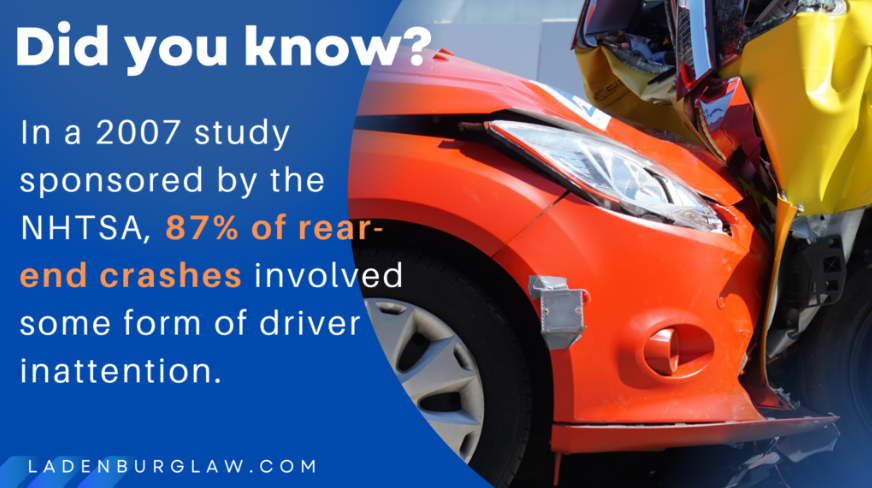Free Case Evaluation
(253) 272-5226Free Case Evaluation
(253) 272-5226Every year, there are roughly 2 million rear-end collisions in the US. While rear-end crashes are rarely fatal, about a third of victims report injuries. These injuries tend to differ from other auto accidents. In our post today, we’ll look at what you should expect after being in a rear-end collision. Plus, the steps you should take (including the most important one).
Topics we’ll cover include:
The number one cause of all rear-end collisions is inattentiveness.
There are several reasons why a driver might be inattentive:
Of course, other risky driving behaviors up the chances of a rear-ender. Some of the main offenders include speeding, tailgating, and driving under the influence.

Some of the most common injuries we see from rear-end collisions include:
When we use the word “whiplash,” we’re referring to the soft tissue damage of the neck. Without a doubt, this is the most common complaint we hear from clients who have been rear-ended.
If you were gripping your hands on the steering wheel, you might also have wrist injuries. More serious injuries are possible, too. For instance, some of our clients have suffered from traumatic brain injuries.
Here’s what you should know. Symptoms may not appear immediately after a rear-end collision. It’s possible to walk away from the crash, thinking that you are OK. And then, a few days later, you wake up to discover intense back and neck pain and stiffness. Because this is such a common scenario, we encourage you to not wait to seek medical attention.
“Are you OK?” your insurance adjustor will ask when you call to file the claim. Our advice: be careful how you answer this question. Insurance adjustors will work hard to discredit your personal injury claim.
Here’s the problem: right after the accident, you may feel OK. (As we said could happen in the section above.) So, you tell the adjustor that you’re uninjured. It’s even worse if you provide this information as part of a recorded statement. The next day you wake up with debilitating back pain. You can’t go into work or carry on with your normal activities. If you go back and tell the adjustor you’re now in a lot of pain, they may not believe you. They might even claim your pain could be from something unrelated.
Bottom line, be careful in how you answer any questions from the insurance company. Do not agree to provide a recorded statement. Tell them that you’ll have the doctor’s report and medical bills sent to their office. Or better yet, tell them that your car accident lawyer will be in touch with them.
The most important thing to do after being rear-ended is to seek medical care. Now. Yes, even before you experience any back or neck pain. Even if you think you’re fine. We recommend taking care of this the same day, if at all possible.
When you go to the doctor’s office the same day of your accident, you help yourself in two ways. First, the doctor can help determine the best treatment for your injuries. Second, getting a doctor’s report is valuable evidence if you end up filing an injury claim.
We’ve emphasized the importance of seeking prompt medical care. What other steps might you take after a rear-end collision though?
What if you have suffered injuries? In that case, we welcome you to call us for personalized legal help. It’s free to speak with our attorneys and we may be able to help you navigate the critical next steps.
If a driver who does not have insurance hit you, you may be able to file a claim against your own insurance policy. Your uninsured and under-insured motorists’ coverage exists for this purpose. Make sure to call your insurance company and tell them what happened.
Don’t forget: an accident attorney can step in and help handle your insurance claim. We recommend calling us if you have significant injuries and high medical bills. An attorney can be a powerful advocate on your behalf, and work to negotiate a fair settlement. Another job of an attorney is to identify all potential sources of funds you could file a claim against.
Not every collision is the same. If you’ve been rear-ended in Washington State, please call the attorneys at Ladenburg Law at 253.272.5226. We know what it takes to handle rear-end collision claims.
Remember, it’s free to come meet with us for an initial consultation about your case. We know that a website isn’t a proper substitute for answering all your questions. We’d love to help you – please reach out!